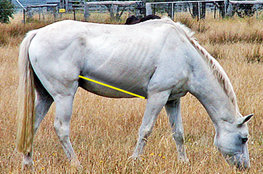Equine Asthma
What is Equine Asthma?
Equine asthma is a collection of symptoms which occur due to an allergic stimulus, such as airborne dust, pollen, or fungal spores. This stimulates inflammation in the airways and results in:
- Contraction of the muscles of the airways, known as bronchospasm.
- Increased mucus in the airways.
- Lots of inflammatory cells move into the lower airways, longer term this can cause the airways to become thickened.
This means the airways are very ‘reactive’ and, because of the mucus and narrowed airways, there is more resistance when your horse is breathing. This results in the symptoms listed below.
What are the symptoms?
| Mild to Moderate Equine Asthma | Severe Equine Asthma |
|---|---|
| - Poor performance | - Exercise intolerance |
| - Occasional coughing | - Coughing |
| - Nasal discharge | - Nasal discharge |
| - Increased breathing rate at rest. | |
| - Increased breathing effort at rest | |
| - There may be a ‘heaves line’ |

Heaves Lines
The yellow line in the picture shows where you will see a heaves line.
This is where the stomach muscle becomes bigger over time due to the increased effort when your horse is breathing.
Diagnosis
We typically diagnose equine asthma based on the history and clinical signs your horse is presenting with.
The History - Often we find there has been an environmental change which can trigger the symptoms such as commencing stabling where dust is a trigger, changing from haylage to hay or different bedding. In some cases where pollen is a causative factor the symptoms may be demonstrating a seasonal recurrence.
Examining your horse – We will carry out a thorough physical exam to help us determine the cause of your horse’s symptoms. As well as listening to the lungs as your horse breathes normally, we may use a rebreathing bag over the nose to encourage the horse to breathe deeply whilst we listen to the lungs. We are listening for abnormal sounds such as wheezing.
Further Investigation – In cases which are not so clear we may need to collect a sample of fluid from the lungs to be examined at the lab, known as a bronchoalveolar lavage. This can help us distinguish from other causes of respiratory disease.
A Treatment and Management Plan.
We can help you find the most appropriate way to treat and manage your horses. It is very important that we focus on both treating your horse as well as implementing management changes to prevent future symptomatic episodes.
Treatments
Corticosteroids
Inhaled or oral steroids are be used to treat equine asthma. They act to reduce the inflammatory response in the airways.
Inhaled Steroids are often considered a better option as when it is inhaled the drug gets straight to airways – where we need it to work.
The Aservo Equihaler is a 10-day inhaler designed and licensed specifically for horses. The medication is what we call a pro drug, it is inhaled deep into the lung in a soft mist. It is then converted to the active corticosteroid in the airways themselves, where it works to reduce the inflammatory response, improving symptoms and lung function. More information on this inhaler can be found on their website (https://owner.equihaler.uk/) as well as a useful video demonstrating how to use it.
Oral steroid medication and injectable steroids are also available to reduce airway inflammation. This type of medication is absorbed systemically so is considered to have higher possibility of potential side effects. We may use a steroid injection when we see your horse if he/she is particularly distressed for rapid administration.
Bronchodilators
Bronchodilators, such as clenbuterol or atropine, relax the airway smooth muscle allowing your horse to breath more easily. These medications are useful to make your horse more comfortable quickly, they may be used alongside a steroid treatment to help relieve symptoms whilst the steroids work. They are available as injections we can administer and clenbuterol (Dilaterol, Ventipulmin) is available as a syrup which can be given in your horses mouth or in their feed. We do not advise continuous use of these medications as this will result in a reduction in how well they work.
Mucolytics
Mucolytic medications make mucus thinner and therefore easier to clear from the airways. An example wound be Dembrexine (Sputolosin).
Management
The most important thing to prevent your horse suffering symptoms of his/her equine asthma is to put management changes in place which will reduce the exposure to the allergens (ie the dust, spores, pollen). The management changes below should help your horse.
-
Avoid stabling (unless your horse has been identified to have pasture associated equine asthma, commonly due to pollen)
-
Using a dust free haylage rather than hay, such as Equilage or soaking hay for a minimum of 30 minutes before feeding.
-
Using dust extracted bedding rather than straw.
-
Ensuring stables are clear of dust and cobwebs.
-
Avoid sweeping the yard whilst your horse is present.
- Ensure your stable has good ventilation.
This link contains useful videos which give advice on some of the management changes listed above: https://owner.equihaler.uk/equihaler
